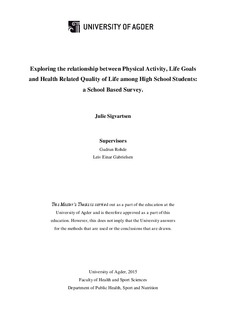| dc.contributor.author | Sigvartsen, Julie | |
| dc.date.accessioned | 2015-09-14T13:24:36Z | |
| dc.date.available | 2015-09-14T13:24:36Z | |
| dc.date.issued | 2015 | |
| dc.identifier.uri | http://hdl.handle.net/11250/299755 | |
| dc.description | Masteroppgave folkehelsevitenskap- Universitetet i Agder, 2015 | nb_NO |
| dc.description.abstract | Background. Intending to increase participation in physical education (PE), two models are
developed: “motion enjoyment” and “sport enjoyment”. The former focuses on health effects
by being physically active and promoting good experiences in PE, while the latter emphasises
athletic sport, activity skills, techniques and improvements of physical performance. The aim
of the present study is to explore differences between the students selecting “motion
enjoyment” and “sport enjoyment”. Additionally, it sets out to examine if life goals and selfreported
physical activity are associated with Health Related Quality of Life (HRQOL).
Method. One-hundred and eighty-one high school students (median age 17), 141 girls and 40
boys were included in this cross-sectional study. HRQOL was measured using KIDSCREEN -
10, and life goals by Adolescents Life Goal Profile Scale (ALGPS). Independent sample ttests,
chi-square and one-way ANOVA were applied to compare students in the two directions
in PE. Multiple regression analysis was used to explore if life goals and self-reported physical
activity are associated with HRQOL.
Results. Self-reported physical activity level and HRQOL is higher among the students in
“sport enjoyment”, while perceived importance of life goals remained the same regardless of
model preferred within PE. Multiple regression analysis revealed that only `attainable
achievements-oriented` life goals with the independent variables `age` and `model in PE`
were associated with HRQOL. Exploring the relationship with self-reported physical activity;
only `like PE` with the independent variables `age` and `vocational programs` were associated
with HRQOL.
Conclusion. Self-reported physical activity habits and life goals are limited associated with
HRQOL. The experience of life goals explore another aspect to individual than HRQOL.
Exploring HRQOL and life goals is an important contribution for public health in order to
increase subjective well-being among adolescents. | nb_NO |
| dc.language.iso | eng | nb_NO |
| dc.publisher | Universitetet i Agder ; University of Agder | nb_NO |
| dc.subject.classification | ME 516 | |
| dc.title | Exploring the relationship between Physical Activity, Life Goals and Health Related Quality of Life among High School Students:a School Based Survey. | nb_NO |
| dc.type | Master thesis | nb_NO |
| dc.subject.nsi | VDP::Medical disciplines: 700::Health sciences: 800::Community medicine, Social medicine: 801 | nb_NO |
| dc.source.pagenumber | 86 s. | nb_NO |
